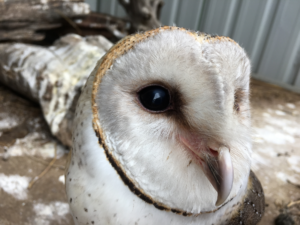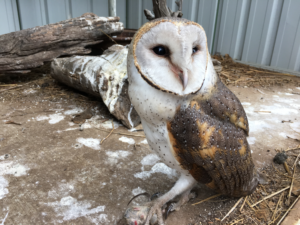
Barn Owls are one of the most beautiful of all Australian owls; their ghostly white underparts contrast with the various shades of brown and grey on their back and wings. They are one of the most commonly encountered owls in the Outback, especially as they hunt rodents close to roads at night. They’ll often be seen perched on a fence post or sometimes fly down across the beam of car headlights in pursuit of their prey. Unfortunately for the owls, many come to grief by colliding with vehicles. Usually this is the last flight the owl will take, but occasionally they may only get clipped or receive a gentler knock.
The owl (pictured) is one such individual that was one of the lucky ones. We do some volunteer care, as well as, founded and continue to support the Maranoa Wildlife Caring and Education Centre. When it came into our care there were no obvious injuries, it was unresponsive and unusually quiet. Often when owls are bought in to care they will hiss, raise their wings and even thrust forward their sharp claws to show who is boss. But not this one. Being lethargic and not eating too well to start with, hopes were not too high that it would make the long road to recovery. But there is always hope, and after about three weeks of being fed mice, eventually this owl regained its appetite and strength. Once it was able to fly again it was returned to the wild.

No sooner had this owl been released that another call came in about an injured owl – this time one that had been hooked up on a barbed wire fence. Unfortunately, owls entangling themselves on fences is a relatively common event. Even if rescued off the fence, the damage to their wings is often so severe that many of them don’t pull through. Either the wing may break in their attempt to dislodge themselves or the constant twisting may do great damage to connective tissues.
The most recent Barn Owl brought in had little damage to its wings and remarkably was flying again within four days. It is eating well too, and we expect it to make a full recovery. Hopefully once released it will avoid barbed-wire fences… and car headlights.
When you travel to Outback Queensland, be aware of these guys as you’re driving. And try to look for them in trees, it is a special sight to see. If you come on one of Boobook Explore’s eco-friendly tours, our guides have a keen eye for this type of animal and can point them out to you.


